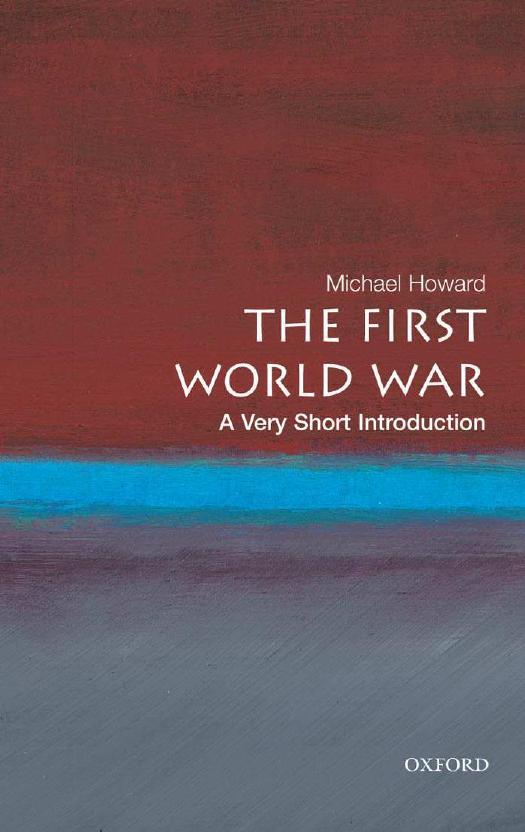The First World War: A Very Short Introduction by Michael Howard

Author:Michael Howard [Howard, Michael]
Language: zho
Format: epub, pdf
Tags: #genre
Published: 2008-06-01T16:00:00+00:00
The Verdun Campaign
By the end of 1915 the German armies had been everywhere victorious, but their victories had brought the end of the war no nearer. The patience of the civilians supporting them was beginning to wear thin. A substantial fronde at home, led within the army by Hindenburg and Ludendorff but supported also by Chancellor Bethmann Hollweg, was calling for Falkenhayn's removal. Falkenhayn still retained the confidence of a Kaiser who resented this attempt to usurp his authority, and did not waver in his belief that victory could be won only in the west. With good reason he calculated that his main adversary was no longer a France now nearing exhaustion, but Britain. Britain's armies were still fresh and largely uncommitted, and her command of the seas was not only maintaining the blockade on Germany but keeping open communications with the United States, on whose supplies the Allies were becoming increasingly dependent. To deal with the latter Falkenhayn urged the waging of unrestrained submarine warfare, which we shall consider in due course. On land, however, he believed that Britain's principal weapon was still not her own untried armies, but those of her ally France. If France could be struck such a shattering blow that she was compelled to ask for terms, `England's sword', as Falkenhayn put it, would be struck from her hand. But, given the tried and tested power of the defensive on the Western Front, how could this be done?
For the solution, Falkenhayn turned to the method that he had already used so successfully in the east: attrition. France should be quite literally bled to death, through the destruction of her armies. The French should be compelled to attack in order to regain territory that they could not afford to lose, and the territory in question would be the fortress of Verdun. Verdun had no strategic importance in itself, but it lay at the apex of a vulnerable salient and was a historic site associated with all the great military glories of France. Falkenhayn reckoned that Joffre could not afford not to defend it, or fail to regain it if it were lost. The German armies would inevitably suffer losses in their own attack, but these, he believed, would be minimized by effective use of the techniques used so successfully at Gorlice-Tarnow: surprise, good staff work, and above all massive artillery superiority. So on 21 February 1916, after a nine-hour bombardment with nearly 1,000 guns, the attack began.
Falkenhayn was right. Joffre had regarded Verdun as strategically unimportant and done little to prepare its defence, but political pressure made it impossible for him to abandon it. Under the command of General Philippe Petain, whose stubborn belief in the power of the defensive had hitherto denied him promotion by his offensively minded superiors, the French troops obeyed their instructions to hang on to every yard of territory, and counterattack to regain any that was lost. Attrition cut both ways: the French inflicted as many losses as they themselves suffered.
Download
The First World War: A Very Short Introduction by Michael Howard.pdf
This site does not store any files on its server. We only index and link to content provided by other sites. Please contact the content providers to delete copyright contents if any and email us, we'll remove relevant links or contents immediately.
| Africa | Americas |
| Arctic & Antarctica | Asia |
| Australia & Oceania | Europe |
| Middle East | Russia |
| United States | World |
| Ancient Civilizations | Military |
| Historical Study & Educational Resources |
The Radium Girls by Kate Moore(11997)
100 Deadly Skills by Clint Emerson(4898)
Rise and Kill First by Ronen Bergman(4753)
The Templars by Dan Jones(4670)
The Doomsday Machine by Daniel Ellsberg(4468)
The Rape of Nanking by Iris Chang(4188)
Killing England by Bill O'Reilly(3985)
Stalin by Stephen Kotkin(3936)
Hitler in Los Angeles by Steven J. Ross(3934)
12 Strong by Doug Stanton(3537)
Hitler's Monsters by Eric Kurlander(3312)
Blood and Sand by Alex Von Tunzelmann(3179)
The Code Book by Simon Singh(3160)
Darkest Hour by Anthony McCarten(3110)
The Art of War Visualized by Jessica Hagy(2984)
Hitler's Flying Saucers: A Guide to German Flying Discs of the Second World War by Stevens Henry(2736)
Babylon's Ark by Lawrence Anthony(2658)
The Second World Wars by Victor Davis Hanson(2509)
Tobruk by Peter Fitzsimons(2492)
